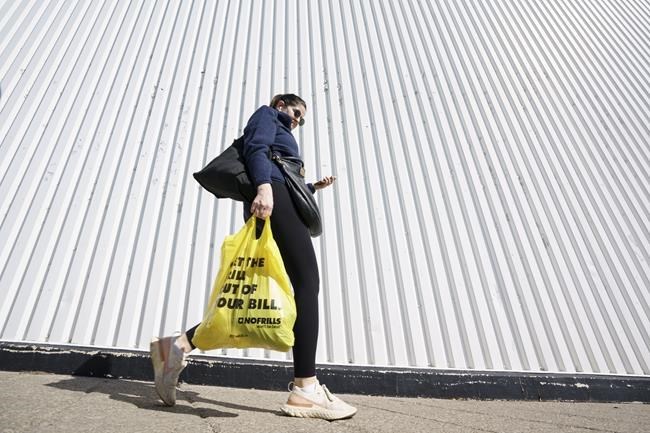TORONTO — The federal government is demanding major Canadian grocers come up with a plan to stabilize prices, drawing pushback from the food industry.
Prime Minister Justin Trudeau on Thursday said the call comes as Canadians continue to struggle with inflation.
"Large grocery chains are making record profits. Those profits should not be made on the backs of people who are struggling to feed their families," he said, speaking in London, Ont., following a caucus retreat.
He said the government will be asking the five largest grocery companies, — Loblaw, Metro, Empire, Walmart and Costco — to come up with a plan by Thanksgiving.
"If their plan doesn't provide real relief for the middle class and people working hard to join it, then we will take further action and we are not ruling anything out including tax measures."
The call comes as grocery prices rose 8.5 per cent year-over-year in July, showing a slight easing of price growth but still running much hotter than overall inflation at 3.3 per cent. August inflation data is scheduled for release on Tuesday.
Major grocers have been facing accusations of profiteering amid high inflation, though executives from the companies denied these allegations before a parliamentary committee studying food inflation earlier this year.
On Thursday, Loblaw and Metro directed requests for comment to the Retail Council, with Loblaw spokeswoman Catherine Thomas saying the grocer is “always open to discussions about what more can be done across the industry.”
The Retail Council of Canada said in a statement that grocer prices and profits have nothing to do with rising food prices, pointing instead to higher costs being passed on from food manufacturers and producers.
The group said that any discussions on food pricing need to also include processors, manufacturers and other relevant businesses along the supply chain.
"We are not going to take part in discussions that time and time again fail to look below the surface as to the true cause of rising grocery prices," said spokeswoman Michelle Wasylyshen.
It's not clear what such a plan from the grocers would look like, or how the government would measure its success, said Michael von Massow, a food economy professor at the University of Guelph in Ontario.
"I am disappointed that we didn't get more detail in what the government is asking," he said.
"It just feels a little bit half-baked."
While it's easy to blame grocers, there are factors that have been driving food prices up along the whole supply chain, said von Massow, such as the war in Ukraine and extreme weather events.
"If they wanted to engage with the food industry broadly to find ways to do (lower prices), maybe they could. But to me, this isn't the way to go about it."
Industry Minister François-Philippe Champagne, who is taking the lead on the grocery price push, said at Thursday's press conference that the government would also be engaging other segments of the food industry.
"We're going to start with the five largest grocers in Canada represent about 80 per cent of the market, and we're going to be in solution mode with very clear deadlines and very clear outcomes for Canadians. And together we're going to look also at large food processors," he said.
"We're going to bring them in Ottawa, talk to them around meaningful action and if they fail to do so there'll be consequences."
Anthony Fuchs, spokesman for Food, Health & Consumer Products of Canada, which represents food producers, said in a statement that both the timing of the announcement and the threat of tax measures were concerning.
"We believe that using taxation as a punitive measure on retailers, especially at this time, is not only ill-advised but might have a detrimental ripple effect on the whole food supply chain, including food producers," said Fuchs.
"Today’s announcement, which proposed a broad approach to a nuanced issue, may lead to unintended consequences."
An industry committee has been working on a grocery code of conduct that aims to level the playing field along the grocery supply chain in Canada.
The code of conduct was proposed as a way to address issues in the sector, particularly between grocers and their suppliers, such as arbitrary fees and sudden cost increases.
In June, the Competition Bureau released a highly anticipated study saying Canada’s grocery sector needs more competition to help keep food prices down as well as provide more options and encourage new entrants to the industry.
Von Massow said if the big five grocers do come up with a plan to lower their prices, that could also inadvertently compete with the Competition Bureau's recommendation to foster independent grocers.
Gary Sands, senior vice-president with the Canadian Federation of Independent Grocers, questioned where independent smaller retailers fit into the picture.
“How do we come up with a plan, when we don't have the leverage to negotiate with suppliers on price increases that they're passing on?” he asked.
“We are facing a myriad of price increases from suppliers, but we don't point the fingers at the suppliers, either, as all those other factors ... are driving up costs.”
This report by The Canadian Press was first published Sept. 14, 2023.
Companies in this story: (TSX:L, TSX:EMP.A, TSX:MRU)
By Rosa Saba and Ian Bickis, The Canadian Press



